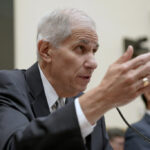
(function(d, s, id) { var js, fjs = d.getElementsByTagName(s)[0]; if (d.getElementById(id)) return; js = d.createElement(s); js.id = id; js.src = “https://connect.facebook.net/en_US/sdk.js#xfbml=1&version=v3.0”; fjs.parentNode.insertBefore(js, fjs); }(document, ‘script’, ‘facebook-jssdk’)); –>
–>
March 10, 2024
A day after his pumped-up divisive State of the Union address, unsurprisingly headlined “fiery” by the copycat media lackeys, President Biden speaking in Pennsylvania reverted to his old befuddled self.
“Pennsylvania, I have a message for you: send me to Congress!”
“Last night [at] the U.S. Capitol — the same building where our freedoms came under assault on July the 6th!”
“We added more to the national debt than any president in his term in all of history!”
‘); googletag.cmd.push(function () { googletag.display(‘div-gpt-ad-1609268089992-0’); }); document.write(”); googletag.cmd.push(function() { googletag.pubads().addEventListener(‘slotRenderEnded’, function(event) { if (event.slot.getSlotElementId() == “div-hre-Americanthinker—New-3028”) { googletag.display(“div-hre-Americanthinker—New-3028”); } }); }); }
Well, the last statement is true. I’ll give him that. And large budget deficits is a pattern in Democrat-run cities and states. Democrats pay off cronies and constituencies with government money and then raise your taxes because they’ve spent more than they were able to squeeze out of the economy.
Nearest to me, that pattern is evident in Maryland and Washington, D.C.: They look the other way at rising crime because they defunded the police and decriminalized conduct and then bemoan empty purses as people and businesses flee. They locked down their states and were surprised to learn that capped the revenue spigot. They made ridiculous, frivolous expenditures like bike lanes and street cars, and painting BLM on a major street and then can’t pay for necessities like cops, road repairs, and schools.
Maryland’s budget problems worsened Thursday with tax receipts failing to hit estimates for the fifth consecutive time since the pandemic ended. The news quickly ratcheted up the rhetoric among Democrats, who are divided on whether now is the time to raise taxes.
‘); googletag.cmd.push(function () { googletag.display(‘div-gpt-ad-1609270365559-0’); }); document.write(”); googletag.cmd.push(function() { googletag.pubads().addEventListener(‘slotRenderEnded’, function(event) { if (event.slot.getSlotElementId() == “div-hre-Americanthinker—New-3035”) { googletag.display(“div-hre-Americanthinker—New-3035”); } }); }); }
Democrats, who have controlled the State House for decades and usually deploy a united front, are ensnared in a behind-the-scenes fight over how to pay for policies that are driving multibillion-dollar deficit projections not seen since the Great Recession.
The latest bad news comes from lackluster income tax receipts, which are now expected to bring in $255 million less than projected over the current and incoming fiscal years, state economic forecasters said Thursday. Tax collectors are seeing less money withheld from Maryland residents’ paychecks than anticipated over the past three quarters, despite record-low unemployment, which suggests a strong labor market.
D.C. is no better:
D.C. leaders are bracing for another tight budget — and a possible tax increase — for the next fiscal year, as the city continues to feel the effects of the pandemic on office vacancies and tax revenue.
D.C. Council Chairman Phil Mendelson (D) estimated that the deficit for the city’s fiscal 2025 budget could be in the range of $600 million to $800 million, while Mayor Muriel E. Bowser (D) has told lawmakers to focus on core services and not as much on new spending. Chief Financial Officer Glen Lee recently released modest revenue growth projections for the city, but he also cautioned the council and the mayor about long-term economic risks as they begin drafting the budget while the commercial real estate market continues to face headwinds. [snip]
Combined with Lee’s relatively flat revenue projections, Mendelson said that other financial hurdles include leaders’ stated commitment to increase Metro funding by up to $200 million, to help stabilize the transit system and avoid extreme cuts; $300 million needed to replenish reserves; and the mayor’s request to increase the per-pupil funding formula for D.C. Public Schools by 12.4 percent, among other major expenses.
‘); googletag.cmd.push(function () { googletag.display(‘div-gpt-ad-1609268078422-0’); }); document.write(”); googletag.cmd.push(function() { googletag.pubads().addEventListener(‘slotRenderEnded’, function(event) { if (event.slot.getSlotElementId() == “div-hre-Americanthinker—New-3027”) { googletag.display(“div-hre-Americanthinker—New-3027”); } }); }); } if (publir_show_ads) { document.write(“
California also comes to mind.
SACRAMENTO — California faces a $54.3 billion deficit as the coronavirus pandemic hammers the economy, the state’s worst budget gap since the Great Recession, state finance officials said Thursday.
The shortfall is almost 37 percent of the current $147.8 billion general fund budget and foretells widespread program cuts absent a federal bailout. K-12 schools and community colleges stand to lose $18 billion alone and are clamoring for money to adapt campuses to a new social distancing reality.
The Department of Finance released its projections in a rare fiscal update a week before Gov. Gavin Newsom is expected to roll out his May budget revision, his first post-coronavirus spending plan. The deficit projection extends to the remainder of this fiscal year and through the 2020-21 period that starts July 1.
Newsom said Wednesday that he expects a prolonged economic downturn. The Finance document suggests that income losses will be far deeper than during the Great Recession more than a decade ago…
“We’ve never experienced anything like this in our lifetime,” he said, adding that the national unemployment rate will soar to “Depression-era numbers.”
The bulk of the deficit comes from a projected $41.2 billion revenue decline over the next 14 months, a drop from the ebullient outlook the state had just four months earlier, according to the Department of Finance. Forecasters believe the state’s big three tax sources — personal income, sales and corporations — will plunge about 25 percent.
 The deficit grows as businesses abandon the state, but the cornucopia of largess never dries up as California now intends to extend health insurance to the large number of illegal aliens flooding the state.
The deficit grows as businesses abandon the state, but the cornucopia of largess never dries up as California now intends to extend health insurance to the large number of illegal aliens flooding the state.
In some states, voters seem to be catching on to this scam. Believe it or not, Washington state is one of them:
Washington state lawmakers pulled off a hat trick Monday, approving three initiatives that push back the progressive policy tide in the state. The new laws will ban a state income tax, make it easier for police to chase suspects, and enshrine a bill of rights for parents whose children attend public school.
That’s good news for residents who have experienced the harmful side effects of progressive policies. In 2021 lawmakers restricted police officers’ ability to pursue suspects in vehicles on grounds that car theft is merely a property crime. Motor vehicle theft in the state increased 73% between 2019 and 2022, according to Washington state House Republicans.
The Washington state constitution forbids a graduated income tax, but last year Democrats in the Legislature approved a tax on capital-gains income, claiming it’s an excise tax. The state Supreme Court upheld the tax, 7-2, and this week’s initiative is an attempt to placate angry voters.
The initiatives are half of a slate of six that were initiated by citizens who gathered signatures and had the measures certified by the secretary of state in January. Under Washington state rules, when a voter initiative is approved by the Legislature, it is enacted without requiring approval from the Governor. The remaining three, including efforts to repeal the capital-gains tax and end cap-and-trade climate regulation, will go before voters in November.
It wasn’t on anyone’s bingo card, but Argentina, long the most profligate of fiscal deadbeats, has adopted fiscal responsibility. On Javier Milei’s first day in office, he eliminated half of the government’s cabinet level ministries. Argentina now has a budget surplus:
Argentina, under newly-elected President Javier Milei, is in the black for the first time in nearly 12 years, as its first monthly budget ended with a surplus of $589 million, at the official U.S. exchange rate.
The country’s economy ministry announced the milestone on Friday, adding the surplus also includes payments on interest accrued on the public debt.
This is “the first (monthly) financial surplus since August 2012, and the first surplus for a January since 2011,” the Economy Ministry said, as reported by the Telam news agency.
Since taking office on Dec. 10, Milei has made good on many campaign promises to fundamentally overhaul the historically socialist federal government of Argentina.
Of course, there are leftist protests against the loss of easy money, but he won overwhelmingly on a pledge to cut federal spending by 14% of the country’s GDP and he set about doing it.
- [quote] 5% of GDP to be cut from federal government transfers to provinces
- 2% of GDP to be eliminated by privatizing public works
- 5% of GDP to be adjusted in an overhaul of the subsidies program, directing support to the neediest households, rather than companies
- 1% of GDP to be cut by eliminating privileged retirement packages granted high-ranking government officials
- 1% of GDP to be reduced by selling or closing unprofitable state-owned companies
It may be harder under our system to achieve as rapidly here what Milei did in Argentina, but we could do more to emulate what President Calvin Coolidge did.
The period from 1919 to 1922 has striking parallels with our own time.
The 1919–1922 period had a significant pandemic — the influenza pandemic…
Both periods also brought a massive expansion of government budgets and publicly held debt… Federal outlays grew by 2,493 percent from 1916 to 1919. Why was that? Because we were fighting the Great War, and we went from low to extremely high outlays overnight.
Yet in 1923, federal outlays were still 340 percent higher than they had been in 1916. So although the war had ended, spending did not come back down to pre-war levels. This is the ratchet effect of federal outlays: they just keep increasing.
Publicly held debt grew from $3.6 billion in 1916 to $22.3 billion in 1923, which is a 519 percent increase…
Coolidge put Washington on a diet and deficits disappeared. Coolidge reduced federal debt by a third… But it wasn’t just about starving the Beltway beast. In a separate piece for the Coolidge Review, John Cochrane explains the beautiful, peaceful revolution that only occurred because Washington did not interfere.
Without government interference, private enterprise quickly electrified the country and created a transportation revolution as more Americans could drive their new automobiles
Average earnings rose 30 percent in a decade. Gross domestic product (GDP) rose by a third… This great economic and lifestyle revolution for Americans of modest means happened with basically no guidance from the federal government. The government largely stayed out of the way.
We can dream, can’t we?
<!–
–>
<!– if(page_width_onload <= 479) { document.write("
“); googletag.cmd.push(function() { googletag.display(‘div-gpt-ad-1345489840937-4’); }); } –> If you experience technical problems, please write to [email protected]
FOLLOW US ON
<!–
–>
<!– _qoptions={ qacct:”p-9bKF-NgTuSFM6″ }; ![]() –> <!—-> <!– var addthis_share = { email_template: “new_template” } –>
–> <!—-> <!– var addthis_share = { email_template: “new_template” } –>





